|
|
|
Sort Order |
|
|
|
Items / Page
|
|
|
|
|
|
|
| Srl | Item |
| 1 |
ID:
184982
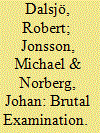

|
|
|
|
|
| Summary/Abstract |
Russian armed forces’ lacklustre performance in Ukraine has surprised military analysts. Shortcomings have included breakdowns in logistics, poor equipment and morale, abysmal communications, and muddled command and control, as well as a weak showing by the Russian Aerospace Forces, air defence, and cruise and ballistic missiles. Chief among the contributing factors are wishful political thinking, overreliance on esoteric doctrine and endemic corruption. War, however, brutally exposes peacetime cheating. Consequently, estimates of Russian military capabilities – in particular, for large-formation combined-arms operations, logistics, air defence and intangibles such as morale – need to be carefully reassessed. Earlier analyses of a Russia–NATO conflict appear to have overstated the challenge of defending Europe. Looking ahead, the conventional threat from Russia seems less daunting than previously thought, and the country faces a formidable task in repairing depleted capabilities. That said, President Vladimir Putin’s appetite for risk is greater than anticipated.
|
|
|
|
|
|
|
|
|
|
|
|
|
|
|
|
| 2 |
ID:
184992
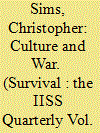

|
|
|
|
|
| Summary/Abstract |
War is a social phenomenon and understanding the local context in which military forces fight should be a central concern of commanders. In Military Anthropology, Montgomery McFate sets out to understand the ways in which research of social practices and behaviours has influenced military action. In a broad historical sweep, McFate examines the lived experiences of several trained and amateur anglophone anthropologists, finding that careful study of societies can mitigate military missteps. The case for including social and cultural comprehension in contemporary military planning is forcefully made, but two distinct problems remain. Firstly, the study of social intangibles frequently fails to yield actionable insights relevant to planners. Secondly, granular understanding is often too localised to interact meaningfully with strategic plans. Underpinning both issues is an ongoing struggle within anthropology to establish a commonly accepted definition of culture.
|
|
|
|
|
|
|
|
|
|
|
|
|
|
|
|
| 3 |
ID:
184985
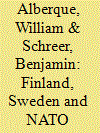

|
|
|
|
|
| Summary/Abstract |
Russia’s war against Ukraine has suddenly made NATO membership for Finland and Sweden highly likely. It would end their long-standing postures of ‘armed neutrality’. Their accession would constitute a major shift in European security. Properly managed, it could produce a net benefit. Both nations would be security providers, with highly capable forces. They would make significant contributions to burden-sharing among the allies and enhance NATO’s ability to modernise its defence planning and capability development. Their membership would also bolster NATO deterrence by complicating Russian military planning in the geostrategically evolving Baltic Sea region. Dealing with Russia in that region, the Arctic and the High North would also become more central to NATO’s strategy and posture.
|
|
|
|
|
|
|
|
|
|
|
|
|
|
|
|
| 4 |
ID:
184990


|
|
|
|
|
| Summary/Abstract |
Al-Qaeda’s interactions with the Taliban have often been marked by mutual suspicion and mistrust, but both groups have adopted robust and ultimately successful approaches to manage these tensions. In particular, the relationship survived turbulent episodes from 2001 to 2011, and the two groups coordinated during the run-up to the Doha Agreement. This suggests that although al-Qaeda’s relationship with the Taliban may remain fraught, it will endure. It is unclear whether the Taliban will allow the group to use Afghan territory to support transnational terrorist operations. But the Taliban will likely be unable or unwilling to constrain al-Qaeda’s regional and international ambitions, and therefore will probably be a highly unreliable partner in any effort mounted by outside powers to do so.
|
|
|
|
|
|
|
|
|
|
|
|
|
|
|
|
| 5 |
ID:
184983
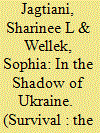

|
|
|
|
|
| Summary/Abstract |
In 2022, India captured global attention over its response to the war in Ukraine. While calling for both parties’ return to diplomacy, India abstained from several United Nations resolutions condemning Russian aggression. For a country that ostensibly subscribes to the values of democracy and territorial integrity, its response appeared frustrating and contradictory, but it is broadly consistent with its long-standing policy of non-alignment. Although India’s relationship with China is increasingly contentious, New Delhi is not yet fully convinced that it is in India’s interest to swing westwards. The country’s relations with Russia and China are deep, complex and substantive. In addition to the military and economic benefits it derives from its connection with Russia, New Delhi and Moscow share an avowed preference for a more equal, multipolar world. India will eventually have to reflect on the extent to which it can sustain its balancing act.
|
|
|
|
|
|
|
|
|
|
|
|
|
|
|
|
| 6 |
ID:
184989
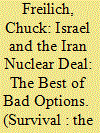

|
|
|
|
|
| Summary/Abstract |
Israel’s national security strategy in many ways has been a historic success. Once a weak, embattled state whose survival was at stake, Israel has become an essentially secure state whose existence is probably no longer in doubt. A nuclear Iran remains the only potentially existential threat, and Hizbullah a severe proximate threat. A simple process of elimination among the options available to Israel shows that a revived nuclear deal is the best of a bad lot. Sanctions, covert sabotage and a military attack are unlikely to yield long-term gains. No one knows if, when or how regime change will occur. A revived deal buys Israel the greatest amount of time and may produce new opportunities if extended. But Israel may eventually have no choice but to launch a military attack, possibly designed to force the international community to take decisive action.
|
|
|
|
|
|
|
|
|
|
|
|
|
|
|
|
| 7 |
ID:
184986
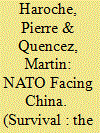

|
|
|
|
|
| Summary/Abstract |
This article explores and assesses NATO’s various options for dealing with Chinese power. Firstly, in terms of military approaches, we argue that NATO is unlikely to play a substantial role in US-led efforts to balance China in the Indo-Pacific region, or to designate China as a ‘threat’ in the North Atlantic area. Given that a clear-cut geographic division of labour between the United States and European partners would weaken the Alliance’s cohesion, NATO should instead focus on better integrating the ‘China factor’ into its military planning, in anticipation of the knock-on effects that a crisis in Asia could have on the European theatre. Secondly, in terms of the political approaches, although a formal expansion of NATO’s competencies is unlikely, stronger coordination with Indo-Pacific actors and with the European Commission could help overcome many of the Alliance’s geographic and functional limitations in dealing with China.
|
|
|
|
|
|
|
|
|
|
|
|
|
|
|
|
| 8 |
ID:
184991


|
|
|
|
|
| Summary/Abstract |
In the last two decades, the rapid growth of many African economies has coincided with deepening commercial and political ties with China and a re-emergence of perilous indebtedness. US administrations have warned that Beijing is ensnarling Africa in debt to gain political leverage and force African states to cede strategic assets to China. The charge that China is uniquely responsible for Africa’s heavy debt is also shaping the flagship debt initiatives of the World Bank and the IMF. An analysis of the theoretical assumptions underpinning the ‘debt-trap’ narrative and the empirical evidence indicates that the preoccupation with China’s role is misguided, and is in fact rendering it harder to service and relieve African debt. Furthermore, framing the African debt problem in terms of great-power rivalry obscures structural features of the international financial system that are far more consequential in shaping the liquidity and solvency of African states.
|
|
|
|
|
|
|
|
|
|
|
|
|
|
|
|
| 9 |
ID:
184988
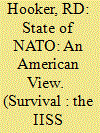

|
|
|
|
|
| Summary/Abstract |
For 70 years, the North Atlantic Treaty Organization has been the backbone of American and European security and a major force for global stability. The unifying threat is now Russia, a quasi-imperial power whose leader, President Vladimir Putin, is intent on reasserting the country’s control over its ‘near abroad’ and re-establishing its status as a great power. Russia’s aggression in Ukraine has produced cohesive Western and in particular NATO resistance, while its military performance there has been stunningly poor. After it rebuilds its economy and military, however, more Russian aggression is possible and perhaps likely. Given Russia’s reckless aggression in Ukraine, NATO members’ readiness and implementation, especially in the front-line Baltic states, now merit more robust discussions. NATO must also revise its Strategic Concept to reflect the primacy of the Russian threat. Above all, the Alliance must have the will to compete, and the US must lead and encourage it.
|
|
|
|
|
|
|
|
|
|
|
|
|
|
|
|
| 10 |
ID:
184984


|
|
|
|
|
| Summary/Abstract |
During the 2016 US presidential campaign, candidate Donald Trump suggested the United States could benefit from a more unpredictable foreign policy. The assassination of Iranian Major-General Qasem Soleimani by US forces in 2020 during the Trump administration may be the best recent example of this doctrine in action. Other American presidents, including John F. Kennedy, Richard Nixon and Bill Clinton, have applied it in different ways. Historical comparisons of its use in the Cuban Missile Crisis and the conflicts in Vietnam and Kosovo suggest that the expected liabilities of the strategy outweigh any likely gains. Russian President Vladimir Putin appears to be seeking to establish strategic unpredictability by threatening NATO with nuclear escalation should it interfere heavily in Russia’s war in Ukraine. This threat, however, has not deterred NATO from providing effective assistance to Ukraine. Policymakers should be deeply sceptical about the benefits of strategic unpredictability.
|
|
|
|
|
|
|
|
|
|
|
|
|
|
|
|
| 11 |
ID:
184987
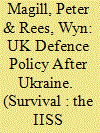

|
|
|
|
|
| Summary/Abstract |
The 2021 Integrated Review of Security, Defence, Development and Foreign Policy signified a major change in United Kingdom’s defence thinking because it identified China as the foremost threat to its long-term security interests. The resulting tilt to the Indo-Pacific region resurrected the prospect of a defence role that the UK had relinquished in the 1960s. Yet the UK can ill-afford to become a significant defence actor in the Indo-Pacific area. The optimal role for the UK is instead to encourage actors in the region to take the lead in countering China. The Russian invasion of Ukraine in February 2022 has reinforced the logic that the UK should concentrate its strength on bolstering the deterrent power of NATO within the Euro-Atlantic area.
|
|
|
|
|
|
|
|
|
|
|
|
|
|
|
|
|
|
|
|
|